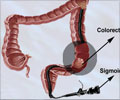Different regions of a single tumor shared as much as 93% of genetic mutations and as little as 67%.

TOP INSIGHT
Each area within an individual rectal cancer tumor contained different genetic mutations. These findings could have significant implications for treatment recommendations since chemotherapy choices often are determined from the genetic make-up of the tumor.
Rectal cancer often returns in the area where it was removed, making treatments such as chemotherapy and radiation crucial in addition to surgery. Chemotherapy choices often are determined from the genetic make-up of the tumor.
Hardiman said, "When medical oncologists make decisions about targeted chemotherapy, they typically base that off the results of a single biopsy. If they're testing only one biopsy, it may or may not reflect what's in the rest of the tumor."
The study authors hypothesize that the differences within a tumor might make the cancer more likely to resist targeted therapies. They are studying patient biopsy samples and mouse models to understand why there is variation within a tumor and why that variation is not present in all tumors.
Mouse models of rectal cancer will also allow the researchers to understand whether certain therapies or combinations of therapies can make a tumor more or less likely to respond.
Source-Eurekalert
 MEDINDIA
MEDINDIA




 Email
Email










